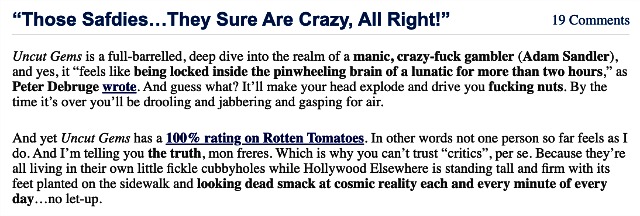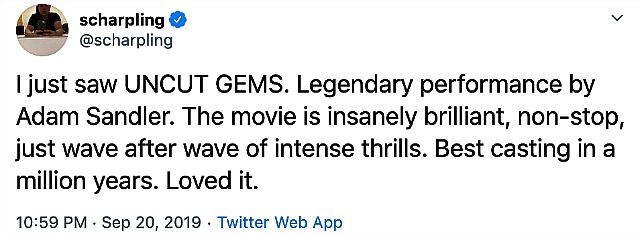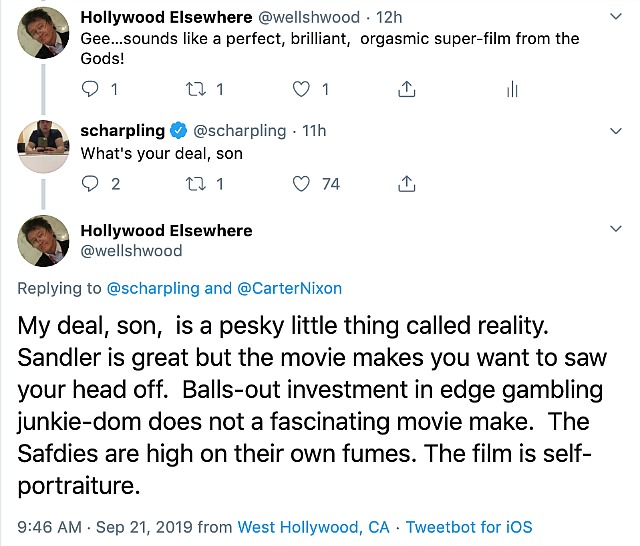“The problem I have with James Gray and why critics love him, I think, is essentially because he’s a cold filmmaker. I’m sure he envisions himself as Kubrick-lite and maybe so since Kubrick also had chilly water flowing through his veins. But none of Gray’s films invite you in — they keep you at arm’s length as an observer, not a participant. Critics tends to dismiss filmmakers who emphasize emotional content. Even Hitchcock, who thrived on emotion, was dismissed in his time. Gray is obviously intelligent but his films exude the sensibility of a calculating, emotionally distant academic.” — Received this afternoon from a filmmaker friend.
Monochrome Moods
Yesterday afternoon, as Tatyana was exchanging her iPhone 6 for a new iPhone 8 Plus, I downloaded iOS 13.0 on my own iPhone 8 Plus, which I’ve had for about 18 months. Many cosmetic but agreeable changes (i.e., faster keyboard, dark mode, new photos tabs, tweaks of this and that) but I’m especially loving all the new visual adjustment options on the camera. I probably could have shot all kinds of mesmerizing black-and-white captures before yesterday, but I’m suddenly into it now because I was lazy before or whatever.

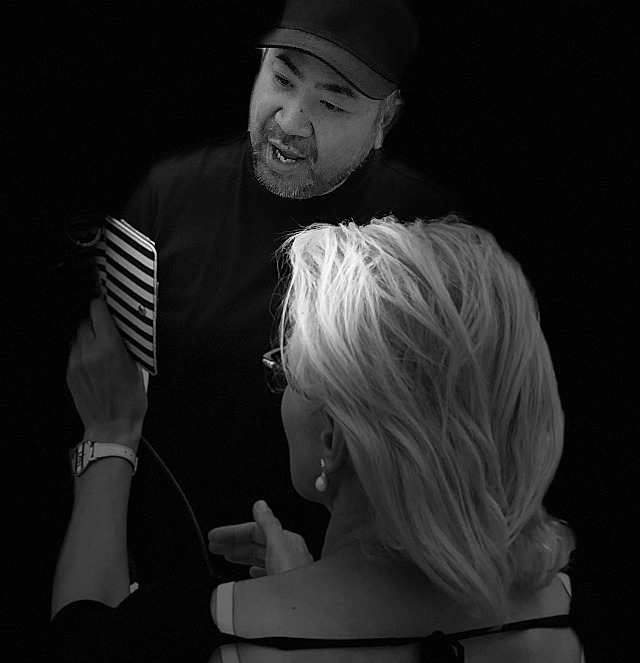

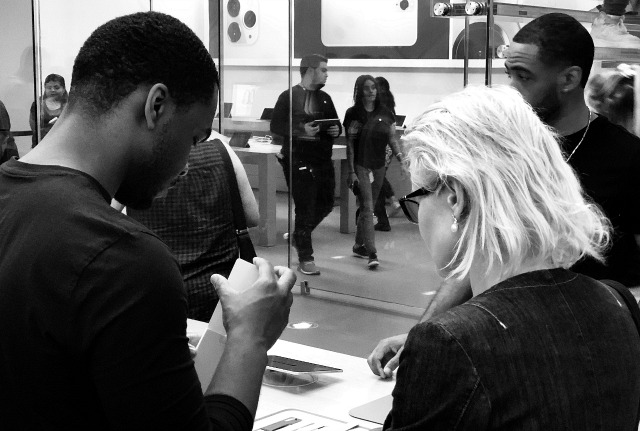
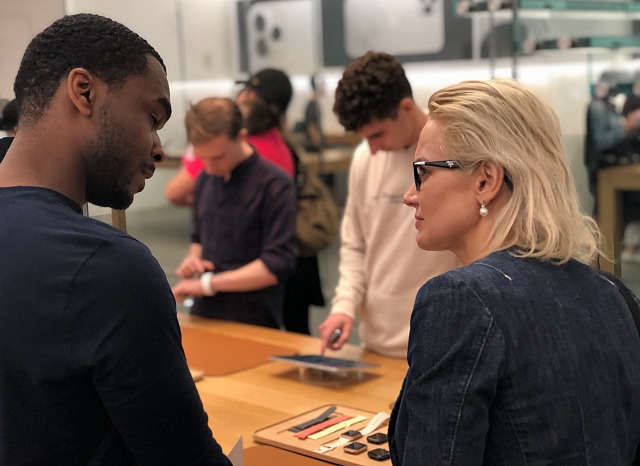
Incident in Jakarta
At first I thought “this is perfect.” Then I began to suspect it might be staged. Why would this feisty woman throw her handbag away? Why would the motorcycle guy park right next to her as he was about to steal her handbag? The more you watch it, the less it adds up.
“Don’t fuck with me, fella” pic.twitter.com/iD9pcENlXf
— Jason Overstreet (@JasonOverstreet) September 22, 2019
“What Have We Done?”
A ’60s rebellion allegory that brilliantly captures the rage and excitement of a revolution in poetic fantasy terms, If… begins as a relatively straightforward story of a few teenaged malcontents — Malcolm McDowell‘s Mick Travis being the ringleader — coping with the routine humiliations imposed upon students by the priggish staff of a military-minded British private school.
But this 1969 film (directed by Lindsay Anderson, and based on a script by David Sherwin and John Howlett) gradually becomes more and more surreal, and not just in a political vein.
That look of fierce concentrated rage in McDowell’s eyes as he and his friends fire their automatic weapons from a rooftop at their public-school enemies….that’s the whole ’60s up-against-the-wall mania in a nutshell. Stanley Kubrick hired McDowell to portray “Alex” in A Clockwork Orange because of how thoroughly he rocked as If…‘s romantic-anarchic hero.
Was If… the first mainstream commercial drama to mix color and black-and-white footage in an impressionist vein? Perhaps another film or two did it first, but no titles are coming to mind.
Posted on 7.8.07: In “Fear and Loathing in Las Vegas“, the late Hunter S. Thompson described the 1966 to ’67 era of cultural explosion-revolution as “the kind of peak that never comes again. San Francisco in the middle ’60s was a very special time and place to be a part of. Maybe it meant something, maybe not in the long run… but no explanation, no mix of words or music or memories can touch that sense of knowing that you were there and alive in that corner of time and the world.”
You can feel some of this as you watch Lindsay Anderson‘s If…. It’s a film that gets eighty or ninety things right (at least), and yet the finest of these is providing a distillation of mid ’60s rightness and holiness and inevitability. Precisely because it’s a metaphor piece and not a recreation of the times (i.e., it uses none of the music).
Except for the long hair and sideburns If… could be happening in the early ’50s or late ’70s or the ’80s, even. It’s about a repressive British school for boys, one that dispenses the old crisp disciplines and stiff-upper-lip values that fortified the British empire for two or three centuries, and about how a lot of this stuff just stopped flying in the early to mid ’60s. And how young people everywhere just knew this.
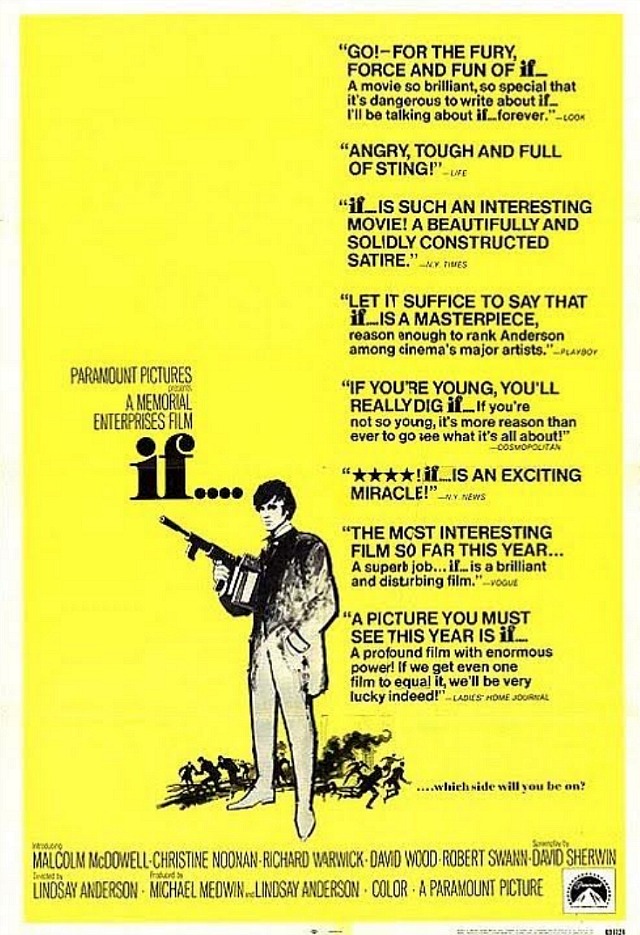
“Placate The Complainer”
Posted this morning (9.22) on Facebook by veteran film journalist Lewis Beale. The Times staffer who didn’t approve of his War of the Worlds location piece getting prominent, above-the-fold placement sounds an awful lot like a certain someone associated with TheWrap, but I wasn’t directly involved so I wouldn’t know.
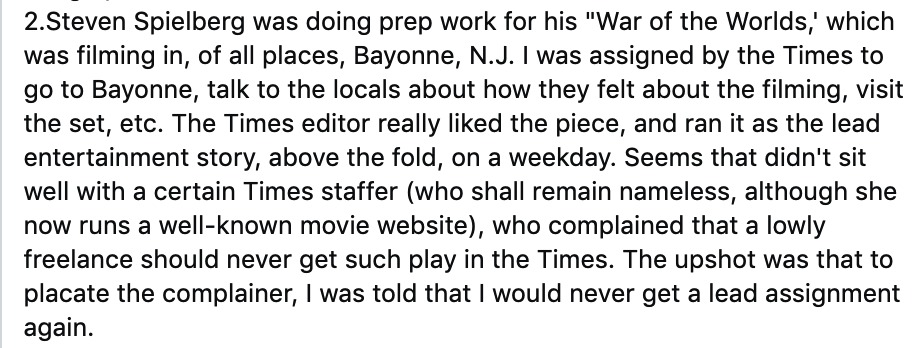
On the other hand Matt Zoller Seitz is saying that if a secular elite critic who worships James Gray…if this person is underpaid and has to constantly “chase checks” and doesn’t have health insurance, he/she can’t be a secular elitist. Trust me — Seitz knows the truth of it. He knows that the James Gray cabal (strong in New York, dominant in Paris) lives on its own aesthetic planet and has almost no sense of what it’s like to be Joe and Jane Popcorn, and no understanding or interest in what Joe or Jane care about and/or are looking for when they go to see a film.
I might despise people who laugh too loud in bars, but I’ve always understood the Joe Popcorn realm. I come from New Jersey, I ride around on a rumble-hog, and I eat hot dogs from time to time. I get it.
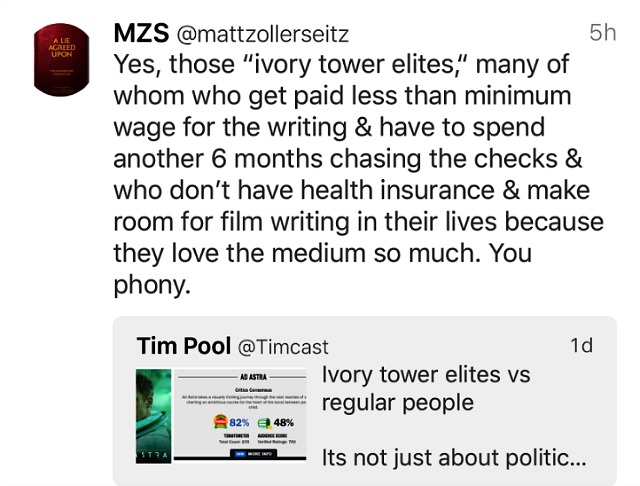
Again — Why “Sorcerer” Failed
[Originally posted on 4.13.14] I’ve never completely bought William Friedkin‘s theory that Sorcerer died because the hugely popular Star Wars, which opened on 5.25.77 (or a month before Friedkin’s film), had ushered in a sudden sea-change in mainstream cinematic appetites.
He meant that a new comic-book, popcorn-high attitude had taken over, and had brought about a consequential lessening of interest in gritty, noirish, character-driven adult dramas.
Sorcerer, of course, was never going to be a hugely commercial thing. It’s a fairly downbeat, men-against-the-elements adventure flick made for guys. Women don’t go for sweaty, atmospheric, end-of-the-road Latin American fatalism. But I suspect that Sorcerer would have been at least a modest success if it had delivered a sense of justice in the case of Roy Scheider‘s character, a wise guy on the run from the New Jersey mob.
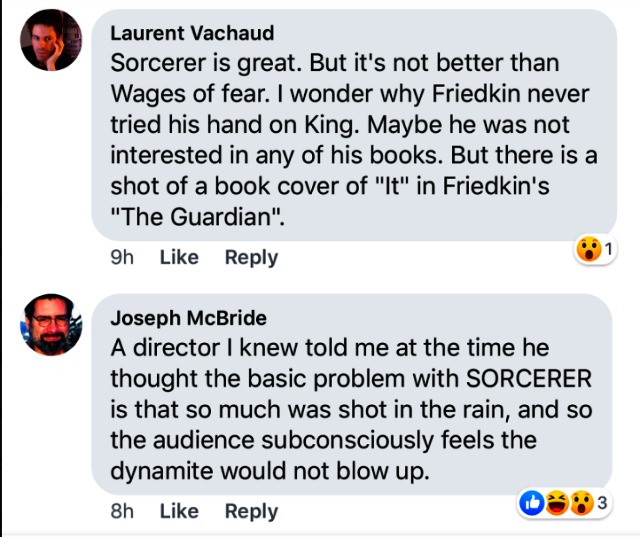
Sorcerer is about four desperate men hired to deliver nitroglycerin in trucks to a burning oil well in the middle of the South American jungle. Scheider is the only one who makes it in the end. He’s gone through hell, and despite his previous criminal inclinations, the audience has been taught to respect him for getting through this terrible ordeal. They may not love him, but he’s done a really tough thing and earned, in movie-story terms, a kind of redemption. A little peace and gratification.
But then Friedkin and screenwriter Walon Green turn around and stab Scheider with an icepick. Mob assassins (accompanied by a friend who had helped him escape the country and who has now obviously betrayed him) arrive at the very end to rub him out, and there’s no escape.
Yeah, yeah, I know — that’s what “noir” is. Life is hard and cruel and then you die. But that’s not how audiences see it.
I felt this way when I first saw Sorcerer, and I felt it again last night. Scheider doesn’t deserve death — he’s earned a chance to live again and maybe do things right for the first time in his life. But Sorcerer rejects this notion, and that’s why audiences rejected it. It left a sour taste by (a) making it clear that Scheider’s scummy, low-life character is possessed by fierce determination and concentration and courage, and then (b) zotzing him anyway. That’s a kind of “fuck you” to the audience, a kind of a burn.
This, trust me, is a major reason why Sorcerer screwed the pooch. A movie doesn’t have to end happily or sadly, but it does have to end on a note of justice.
Two Pokers In One
Whenever I do the Oscar Poker shingaling with World of Reel‘s Jordan Ruimy, discipline flies out the window. We can’t seem to restrict ourselves to a half-hour discussion; it always goes long. This morning we went 90 minutes, so I’ve cut the discussion in half — part 1 and part 2, each about 45 minutes.
We talked about everything — William Friedkin (Sorcerer and To Live and Die in L.A.), the Safdies and Uncut Gems, The Irishman (“Goodfellas by way of Silence”), Jojo Rabbit, Stanley Kramer and Judgment at Nuremberg, Renee Zellweger and Judy Garland, wokester critics vs. movies about white male milieus (The Irishman, 1917) and a general reluctance to settle into whiteness…wokesters prefer POCs and multicultural environs as a rule.
Once again, part 1 and part 2.
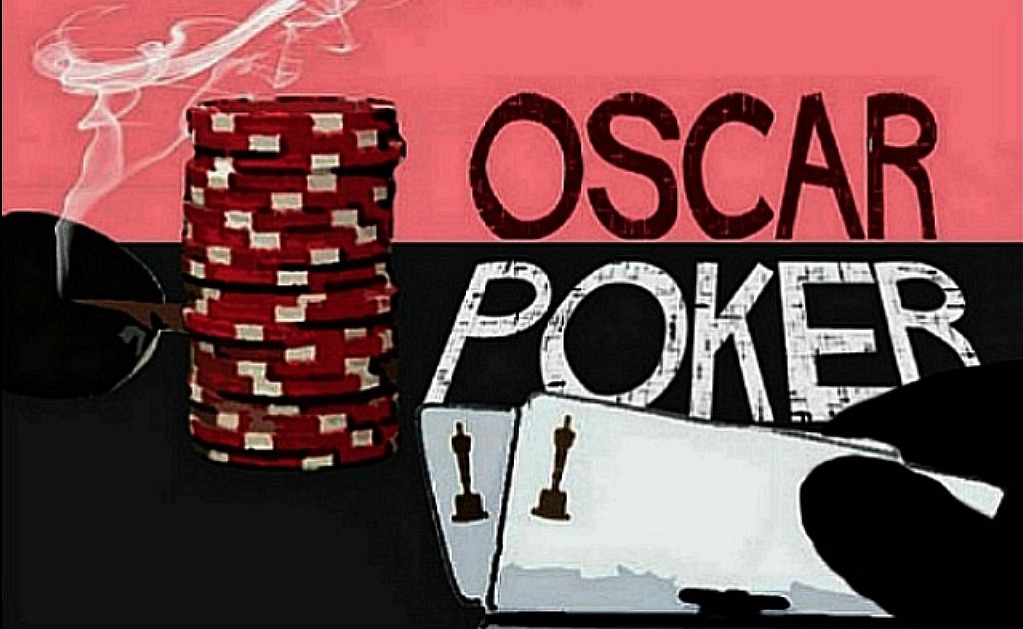
You Cheated, You Lied…
Tonight I happened upon a semi-famous episode on Boris Karloff‘s Thriller called “The Cheaters.” A creepy tale about hidden faces and agendas — about magic glasses that show what people are really thinking and feeling inside. It ends with an egotistic writer putting them on and seeing a monster in a mirror, and then howling and clawing his face.
Directed by John Braham, written by Donald Sanford and based on a story of the same name by Robert Bloch (author of the original “Psycho” novel), it first aired on 12.27.60.
Life is a constant series of games — fibs, feints, dodges, mild deceptions. Is anyone ever 100% honest about anything? Yes, your pets are. And, if you’re fortunate, a close friends or two. (At least sometimes.) Otherwise you’re on your own. People are always putting a gloss on what they think and really feel. Allusions, not declarations. Maybe that’s how it should be. If you can’t say anything nice, go on Twitter.
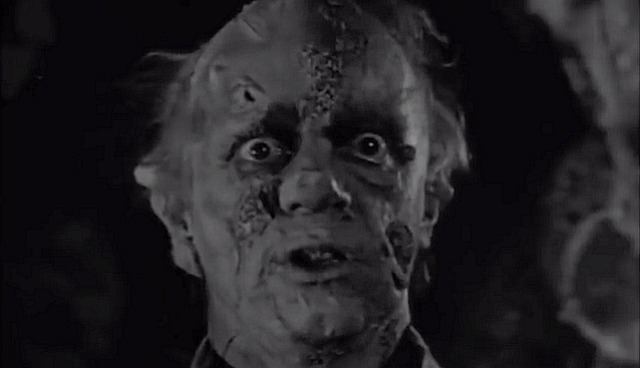
Critics, Joe Popcorn Disagree
Yesterday’s box-office tallies for Rambo: Last Blood and Ad Astra aren’t far apart. Playing on 3618 screens, Rambo earned $7,170,000 while Ad Astra, on 3460 situations, brought in $7,161,000. But on CinemaScore, Ad Astra earned a lousy B-minus vs. Rambo‘s slightly better B. Which film is better in the eyes of the Movie Godz? You have to ask?
But the most telling measure is the contrast between critic and readers reviews on Rotten Tomatoes. Rambo is doing great with the hoi polloi (84% positive) but not great with critics (30%); Ad Astra is supported by four out of five critics (82%) while the public has given it a failing grade (47%).
Here are links to actual RT reader comments for Rambo vs. Ad Astra.
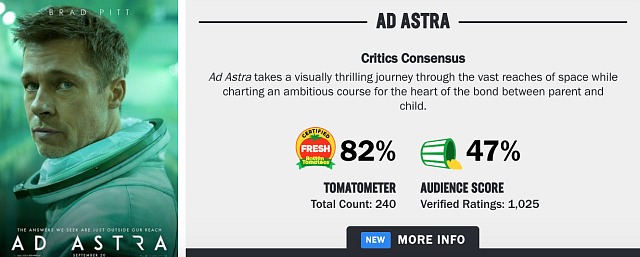
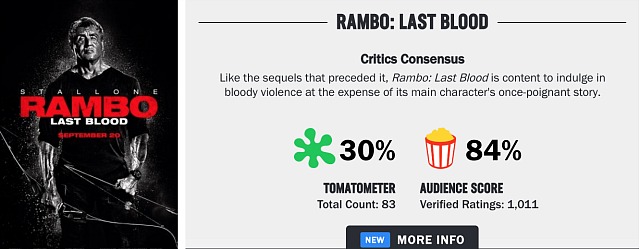
Soul Communion
I’ve had my differences with a few Twitter jackals (and I’m talking about people who deserve to be chained in medieval dungeons on bread-and-water diets), but they don’t understand who I am in the eyes of Anya. I am her lover, parent and care-giver, and she’s my brilliant daughter — as smart as any Jack Russell, fickle, curious, emotionally demanding and 24/7 affectionate.
Outside of family and my marriage to Tatyana, I’ve never been in a more emotionally open, nurturing and trustworthy relationship than the one I’ve had with Anya for the last two and a half years. I’m sure Tatyana feels the same way. The three of us.
Anya was born in a Playa del Rey home in May 2017, and may she remain with us until…well, sometime in the mid 2030s. Siamese cats are extra in all kinds of ways.

Demonic “Dharma”
“American Dharma is certainly a story about a man who lives in a strange fantasy world. Early Christianity, John Ford movies, nationalist ideologies…an incoherent mess, in my opinion.” — — Errol Morris, director of American Dharma, an exploration of the mind and ideology of Steve Bannon, during a 2018 Toronto Film Festival q & a.
In other words, Morris is no admirer of former Trump administration svengali Steve Bannon, and so American Dharma casts significant doubt upon Bannon’s overthrow-the-deep-state, hooray-for-the-red-hats bullshit. But at the same time it does a curious thing — it presents Bannon as a half-mythical figure, a man of steel and conviction, tough-minded but thoughtful.
If you have a semi-developed brain and at least some analytical abilities, you’re going to recoil in quiet horror at what Bannon is advocating here, but at the same time you’re going to be half-impressed by the way he comes off as a cinematic figure, as a fellow who’s part of a fraternity of strong, square-jawed honey badgers (including Gregory Peck in Twelve O’Clock High, Alec Guinness in The Bridge on the River Kwai) who don’t give a shit but are determined to get the job done.
Right-wingers may feel conflicted about American Dharma (as I do) but they’re not going to flat-out hate it. Because there’s something faintly (emphasis on the “f” word) attractive about the way Bannon is portrayed.
I agree almost entirely with Michael Moore‘s Fahrenheit 11/9, but American Dharma, troubling as it is, is a more transporting film, certainly in a visual sense.



